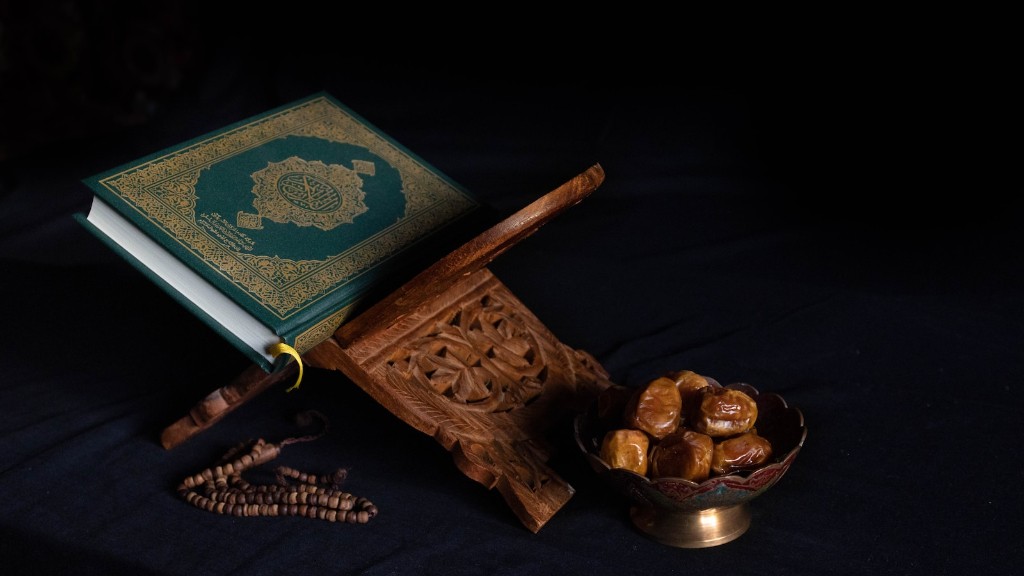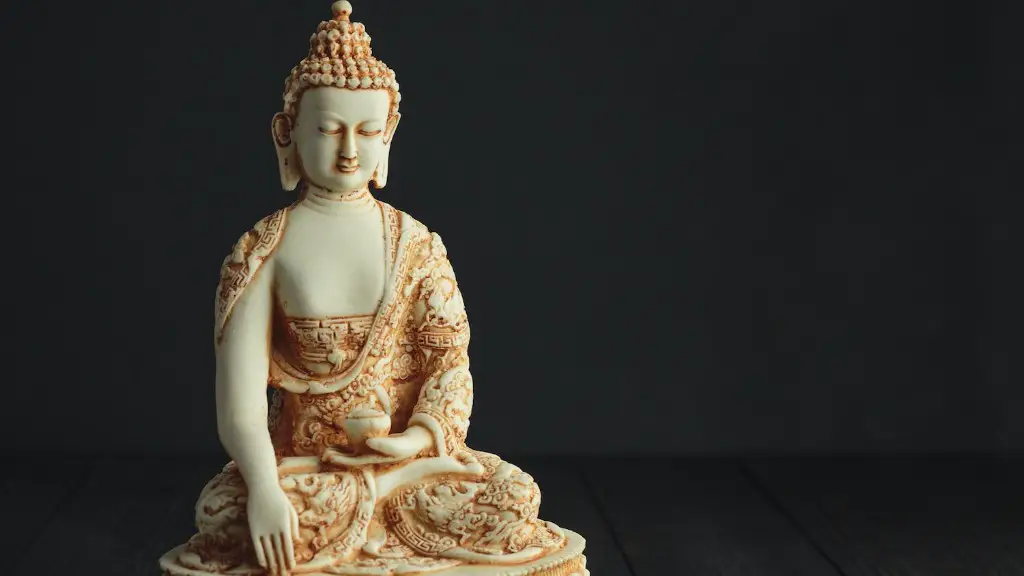Cows have had a special place in Hindu culture for thousands of years. In Vedic texts and Upanishads, they are revered as a symbol of life, wellbeing and abundance. In Hindu mythology, cows are associated with many deities, including Shiva, Krishna, Parvati and Saraswati. The cow has come to represent strength, prosperity and auspiciousness, and is often seen as an embodiment of divine power.
In Hinduism, cows are considered to be sacred and are often referred to as “go-mata” or “Mother Cow”. This is due to their strong links to agriculture, livelihoods and land management. They bring nutrition to the soil and provide fuel for cooking. Besides, cows are regarded as the nurturers of nature and a source of sustenance to all of humanity.
The Vedas revere cows, with several hymns dedicated to them as symbols of prosperity and wealth. They are also seen as symbols of fertility, abundance and nourishment. In Hindu customs, cows are associated with sacred rituals and offerings. They are used to decorate the home during special occasions like Diwali, Navratri and other festive occasions. They are also considered to produce purifying energy, the only energy that can cleanse the air and bring blessings.
In India, cows are viewed as a gift from deities and thus, it is considered wrong and disrespectful to harm them in any way. In fact, in some Hindu scriptures, violent acts against a cow lead to severe punishment and sin. To avoid this, Hindus have developed strict laws and regulations to protect cows and even maintain a separate cuisine for cows that are known as gau-bhakti or cow devotion.
Moreover, Hinduism promotes vegetarianism, which is based on a philosophy of non-violence. This has led to a further extension of their reverence for cows, as it is believed that cows are the givers of life, they produce milk and they are capable of providing sustenance to people. Thus, many Hindus do not eat beef out of respect for cows, as they are seen as a symbol of abundance and prosperity.
Apart from this, cows are often used as offerings in temples to honor the gods. Additionally, Hindus also celebrate the birth of a cow by offering prayers and offerings to the cow and her calf. On the cow’s birthday, they decorate her with garlands and make her the center of their offering. This shows how much value is placed on the esteemed existence of cows in Hindu culture.
In conclusion, cows are held in high regard in Hinduism as they are regarded as a symbol of life, abundance, prosperity and are an embodiment of divine power. They are viewed as Go-Mata or ‘Mother Cow’ and are used for many rituals and offerings in temples. Hindus also celebrate the birth of a cow on her special day and embrace her with reverence and admiration.
The Role of Cows in Agricultural Practices
Cows are significant to agricultural activities in India and the countryside in general. They supply natural fertilizer to the soil, serve as engines of plowing, and are a source of food and materials. Cows form an essential link between the everyday lives of rural people and the natural environment.
In India, the sacred cow is an emblem of nature’s abundance and represents agricultural pursuits. Cow-dung helps enrich and aerate the soil and provides sustenance to crops. Farmers have understood the value of cows and will often bring the cows out to graze in the fields during the growing season. This helps maintain the soil fertility and the cycle of nourishment.
Furthermore, Indian farmers depend on cows for their livelihood. Cow-milk and ghee (clarified butter) are highly prized dairy products that are used for consumption and ritualistic purposes. Over the years, Indian farmers have developed a variety of methods to meet their daily needs. These include the production of ghee, yogurt, and cheese, among others.
Due to their importance to the rural and agricultural communities, cattle have been made exempt from any form of taxation since ancient times. In India, cows are exempt from any form of taxation up to a certain amount (15,000 to 20,000 INR depending on the states). This further emphasizes the significance of the cow in Indian society.
In Hindu scriptures, cows and bulls play a significant role in the Vedic ceremony. They are seen as goddesses and gods and are bedecked with decorations during ceremonies. This further highlights the priestly and spiritual role cows have in the Hindu faith.
In addition, cows are venerated and held in high esteem as individuals, primarily due to their contribution to society and the environment. For instance, cows provide milk for human consumption and medicines derived from cow dung and urine are commonly used in traditional Indian medicine. This further cements their spiritual and practical importance in the Hindu faith.
The Legal Status of Cows in India
In India, cows have legal rights and protection by the Supreme Court of India. In 2014, the court passed a national law that has effectively made it impossible to slaughter cows in India. After the law was put into place, the trade of cows had to face limitations due to the law which prohibits any sort of trade in cows. On top of this, the court also made a mandate that any person or company wanting to trade in cows will have to obtain permission from the District Magistrate.
Furthermore, in some Indian states, cow related activities such as selling, transporting or even slaughtering cows are a punishable offense. According to this law, any person found to be involved in such activities can face imprisonment for up to 10 years along with a hefty fine. This further demonstrates the extent of protection for cows in India.
Another instance of protecting cows is the establishment of gau-shalas (shelters for cows) across the country. These are places where the sick, elderly, infirm or abandoned cows are taken in and provided with food, healthcare and shelter. This is in keeping with the Hindu belief of considering cows as a sacred species.
Overall, the legal status of cows in India is quite strong, with a large degree of protection. This is a reflection of the strong religious beliefs associated with cows and the importance accorded to them in Hinduism.
The Importance of Cows in Hindu Culture
In Hindu mythology and religion, cows are given a special unique status in many ways. One of those ways is that it is believed that by worshipping the cows, one can attain the five goals of life, namely success, love, freedom from fear, strength, and freedom from desires.
In addition, cows fulfill religious guidelines set in Hinduism. For instance, cows are a symbol of ahimsa or non-violence and for this reason, Hindus refrain from consuming beef and other meat products. Also, women who live in Hindu households worship cows and offer food and water to the cows every day.
In addition, Hindus believe that the donation of cows brings special merit and is an act of great charity. On top of this, there are various festivals devoted to the worship of cows. This again reflects the utmost reverence and respect given to cows in Hinduism.
Also, cows are often seen as a source of prosperity within the Hindu culture. This is why they are offered as gifts to temples and relatives during festivals. This reflects the belief that the cows bring abundance and blessing, something that is seen as essential in Hindu society.
Finally, cow milk is seen to be highly auspicious in many Hindu households. Drinking milk is believed to bring prosperity and ward off any evil forces. This further illustrates the importance of cows in Hinduism, where cows are considered a symbol of abundance, nourishment, and prosperity.
Conclusion
In conclusion, cows are held in high regards in Hinduism as they are viewed as a symbol of life, abundance and prosperity. They are revered as Go-Mata or ‘Mother Cow’, who are used for many rituals and offerings in temples. Moreover, Hindus also commemorate the birth of a cow on her special day, embracing her with reverence and admiration. Additionally, cows also form a support to agricultural activities and are a source of food and materials. Furthermore, the legal status of cows in India is quite strong, with a large degree of protection, which reflects the strong religious beliefs associated with cows in the Hindu faith. Finally, cows also fulfill religious guidelines set in Hinduism, where cows are a symbol of ahimsa or non-violence and are believed to bring prosperity, abundance and blessings.



